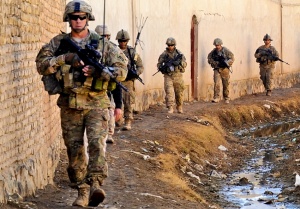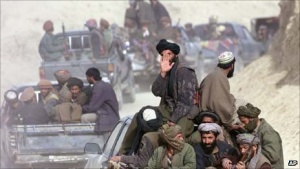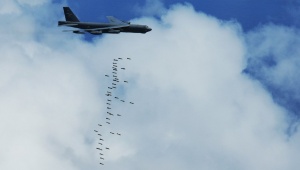
The War in Afghanistan: Will It Ever End?
The War in Afghanistan: Will It Ever End?

(The U.S. Army/Flickr) -American military personnel in Afghanistan
The War in Afghanistan has ground on for more than 16 years since its start on October 7th, 2001. Operation Enduring Freedom was part of the response to the September 11th attacks, but there does not appear to be a clear end in sight. [1] Over the years, the number of troops in Afghanistan has risen and fallen, but the war has ground on. At one point, in August of 2010, [1] there were as many as 100,000 troops. The budget for 2018 was just released and the sum will cost the American taxpayers $45 billion dollars. [4] 3,200 young American men and women have lost their lives fighting for our freedom. Mustn’t we acknowledge that from where things now stand, you’d be forgiven for asking if will this war never end?
Our main goals in 2001 were to dismantle the Taliban government in Afghanistan and end Osama Bin Laden’s reign as leader of Al-Qaeda. Although Osama Bin Laden was killed and the Taliban were disassembled, the latter have been regrouping. It seems we are in a Doom Loop.

(AP/BBC News)- “Defecting Taliban fighters drive through the front line in the village of Amirabad, northern Afghanistan”
Our leaders realize there is no end to this war. The cat and mouse game of killing and capturing Taliban has been going on for a decade and a half. Afghanistan does not have a stable government or infrastructure to rely on. There is a “combination of state collapse, civil conflict, ethnic disintegration and multi-sided intervention that has locked it in a cycle that may be simply beyond outside resolution.” [2] Afghanistan has been in disarray for a long time; any hope for a stable country may reside ten years down the road.
The main reason the U.S. stays in Afghanistan is to avoid creating a vacuum that would turn into a terrorist breeding ground. Roger Shanahan from Sydney’s Lowy West Asia Program said to achieve what we want, “You need to destroy that safe-haven element and as part of that strategic aim, you want to build Afghan governance so that it can control the areas it supposedly has sovereignty over” [1].
Much as we would like to leave, we simply can’t. During the past few weeks, we have seen how strong the Taliban remains. There was a “series of bold terror attacks in Kabul that kill[ed] more than 115 people” [3]. The Trump Administration has responded to these attacks by, “…deploying troops across rural Afghanistan to advise Afghan brigades and launching air strikes against opium labs to try to decimate the Taliban’s finances.” [3] President Trump has also ruled out the idea of directly negotiating with the Taliban. [5]
Training the local Afghan military has seen some progress, but not nearly enough for the Afghan military to take on the Taliban itself. The Army recently announced that six units of 1,000 soldiers from the 1st Security Force Assistance Brigade will deploy in the Spring “specially designed to ‘advise and assist’ foreign armies so that they can contain guerrilla movements on their own” [5]. The goal of creating these special units is that they will be able to advise the Afghanistan military rather than simply overseeing operations.
The harsh reality is that America’s longest running war will not end for some time unless the U.S.decides to pull its troops from the country precipitously. To the contrary, the U.S. presence will remain for the foreseeable future. That fact notwithstanding, the Washington Post recently noted our outlook, how we approach elements of the war may change. According to the Washington Post, “The expansion of the U.S. bombing campaign in Afghanistan to target a little-known Chinese terrorist group is an example of how the 16-year-old war has changed under President Trump” [6].
Targeting groups such as ETIM (East Turkestan Islamic Movement) and TAP (Turkistan Islamic Party) betrays just how many formerly independent terrorist organizations are beginning to consolidate in-country. The war, simply stated, is not simply about fighting the Taliban anymore. According to Air Force Brigadier General Lance R. Bunch – the director of future operations at U.S.-led military headquarters in Kabul – it’s about fighting, “anybody that is an enemy of Afghanistan” [6].

(U.S. Air Force)-A B52 Bomber dropping its payload on training camps of ETIM and TAP
Sources:
- https://www.cnn.com/2017/08/21/asia/afghanistan-war-explainer/index.html
- https://www.nytimes.com/2017/08/24/world/asia/afghanistan-intervention-state-collapse.html
- https://www.cfr.org/timeline/us-war-afghanistan
- http://thehill.com/policy/defense/372641-pentagon-war-in-afghanistan-will-cost-45-billion-in-2018
- https://www.politico.com/story/2018/01/26/afghanistan-specialized-units-army-312032
- https://www.washingtonpost.com/news/checkpoint/wp/2018/02/10/bombing-of-chinese-separatists-in-afghanistan-is-a-sign-of-how-trumps-war-there-has-changed/?utm_term=.38ae9169e425
